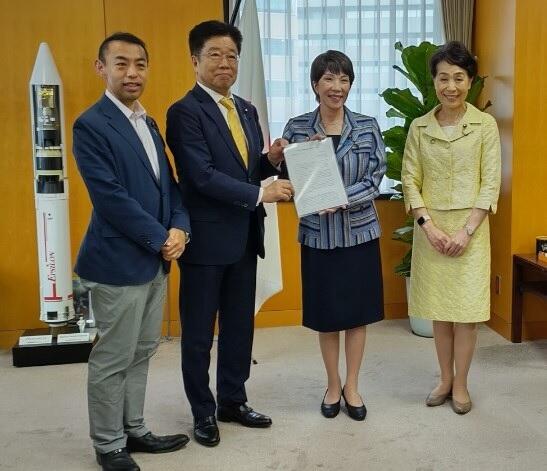The Group of Diet Members for the Promotion of Regenerative Medicine (Chairman: Katsunobu Kato, a member of the House of Representatives) delivered recommendations to Sanae Takaichi, Minister of State for Health and Medical Care Strategy, to promote the industrialization of regenerative medicine of Japanese origin. The recommendations covered a wide range of issues, including the establishment of the ecosystem and human resource development, regulation in line with product diversification, and improvement of access to regenerative medicine and the insurance system. Minister Takaichi said, "I felt that we share a common awareness of the issues. We would like to fully consider these recommendations as we formulate our third-term health and medical care strategy."

Drug lag/loss has become a major issue. The rate of this for new modalities, including regenerative and cellular medicine and gene therapy, is particularly high and is predicted to become even higher. Regenerative medicine is one of the areas where Japan can take the lead based on induced pluripotent stem (iPS) cell research and other efforts. Japan must continue to promote and strengthen research and development from the basic stage to create new seeds for regenerative medicine and promote efforts toward the industrialization of basic research outcomes.
The recommendations include specific measures to address the three issues: "ecosystem establishment and human resource development," "regulation in line with product diversification," and "improvement of access to regenerative medicine and the insurance system." These issues have been raised from the following concern: the problems of regenerative medicine cannot be solved by an approach of making attempts to solve problems efficiently within one field and, when necessary, seeking collaboration with other fields; rather, a different approach is needed to seek a comprehensive solution to the problems by tackling individual problems based on collective knowledge. For example, in terms of human resources, the recommendations include strengthening the development of human resources for reverse translational research; the development of human resources with a broad discipline of natural sciences, humanities, and social sciences; continued support for the development of manufacturing technology and training environments on actual equipment or equivalent scales; and the establishment of a system for the development of professional human resources for manufacturing sites, such as a qualification certification system.
The recommendations related to startups stressed the need to promote clinical research on seeds through appropriate support for each stage, including the establishment of a companion support system involving engineering academia, pharmaceutical companies, CDMOs, and other entities with relevant expertise; the construction of a mechanism for shared use of production facilities equipped with expensive equipment and high-performance facilities by multiple startups; and consideration of a wide range of support measures for early-stage startups, such as a regenerative medicine gap fund. With regard to regulations and systems for regenerative medical and related products, the following recommendations were made: the urgent introduction of a framework for timely and appropriate improvements through discussions among policymakers, industry, academia, and government based on data accumulated after approval, without being bound by previous cases and judgments on pharmaceutical products; and the establishment of opportunities to review various restrictions and requirements on manufacturing and provision of such products as needed for the appropriate social implementation of regenerative medical and related products. Furthermore, the recommendations also point out that the following should be considered: medical institutions that have established a system for the provision of regenerative medical products and related products should be provided with appropriate support, such as subsidies for system development, including the introduction of equipment and the hiring of specialized staff; physicians' techniques and the maintenance and management of medical institutions' systems should be evaluated appropriately through medical fees and other means; and a scheme to use private insurance programs for technologies certified by academic societies.
This article has been translated by JST with permission from The Science News Ltd. (https://sci-news.co.jp/). Unauthorized reproduction of the article and photographs is prohibited.




